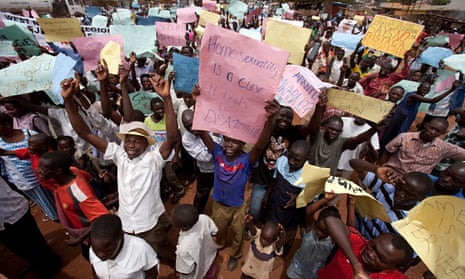Chad looks set to become the 37th country in Africa to outlaw homosexuality after government ministers voted to make same-sex relations a crime punishable by up to 20 years in prison.
The decision, yet to be ratified by the country’s president, was condemned by human rights groups as another setback in the struggle for gay rights on the continent. Chad’s penal code is more than half a century old and does not explicitly mention homosexuality.
But section 361 of a draft new code states the punishment for anyone who has sexual intercourse with someone of the same sex is 15 to 20 years in jail and a fine of 50,000-500,000 Central African francs (£60-£600), according to a document seen by Agence France-Presse.
The cabinet claims that the measure is intended to “protect the family and to comply with Chadian society”. It will go before MPs and President Idriss Déby to be rubber-stamped. Graeme Reid, director of the lesbian, gay, bisexual and transgender rights programme at Human Rights Watch, said : “This is a setback for legal reform in Chad – the revisions to the penal code are intended to integrate national law with international law, whereas this provision would do exactly the opposite.”. The US-based Robert F Kennedy Centre for Justice and Human Rights called on Déby to strike down the proposed law. “By criminalising homosexuality, Chad’s proposed penal code is an instrument of discrimination, not of justice,” said its president, Kerry Kennedy. “I urge president Déby and the Chadian parliament to reject any attempts to make prejudice the law of the land.”
The new penal code also abolishes the death penalty, more than a decade after the last execution of prisoners, a move welcomed by activists. “This is very good news, which is unfortunately marred by the criminalisation of homosexuality,” Florent Geel, Africa director of the International Federation of Human Rights, was quoted as saying by the Gay Star News website. “Criminalising homosexuality seems discriminatory, demagogic and counter-productive, as it may turn groups against each other.”
Geel added that the reform of the penal code had been in preparation for 10 years but the question of homosexuality, while considered immoral, had never been an issue in Chad.
The development is part of a wave of homophobia sweeping across Africa. Some observers believe it may have been a response to the increased visibility and assertiveness of gay lifestyles and politics in Africa, though US evangelical Christians have been widely blamed for instigating draconian anti-gay legislation in Uganda and other countries. Same-sex relations are illegal in 36 of the continent’s 54 countries, according to Amnesty International, and punishable by death in some.
Last month the Gambia passed a bill imposing life imprisonment for “aggravated homosexuality” relating to repeat offenders and people living with HIV/Aids. The Gambia’s president, Yahya Jammeh, has previously told gay men and lesbians to leave the country or risk beheading.
Uganda recently attempted to impose draconian penalties for the “promotion of homosexuality”, including life sentences for various same sex acts. The law was struck down by judges on a technicality but is expected to be reintroduced by MPs.
In January, the Nigerian president, Goodluck Jonathan, signed into law a bill criminalising same-sex “amorous relationships” and membership of lesbian, gay, bisexual, and transgender rights groups. Robert Mugabe, the Zimbabwean president, regularly attacks gay people in speeches and recently said he resented western aid because it depended on conditions such as accepting homosexuality.

Comments (…)
Sign in or create your Guardian account to join the discussion